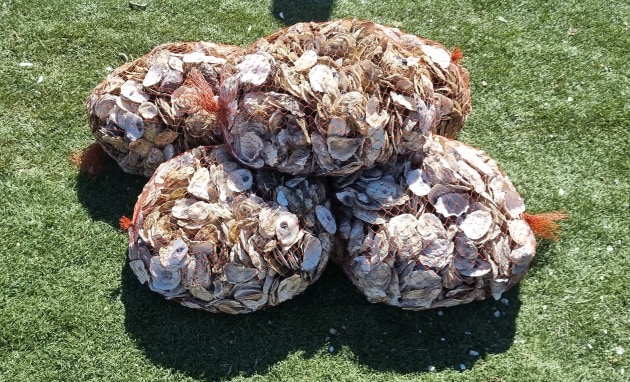Mesh bags (known as BESE bags) made from biopolymers from 100 per cent sustainably sourced vegetation are being tested to see if they can grow oyster clusters for shellfish restoration in the Maroochy River and Moreton Bay region as part of the National Landcare Program.
OzFish is using the trial to see if the BESE bags could become a lightweight alternative to the Robust Oyster Baskets (ROBs), which are used to restore shellfish populations but are much heavier, expensive and more time consuming to construct.
Fishing conservation charity OzFish Unlimited teamed up with Healthy Land and Water through the National Landcare Program and the Bunya Bunya Country Aboriginal Corporation to test out the pilot project.
OzFish project manager for South-East Queensland Abbie Taylor said one of the benefits of the bags was that they slotted into each other, like sandbags.

“The biggest issue is not just getting the shell in the water. We want to create a 3-D structure to allow more organisms to grow on the shell such as baby oysters and also to provide habitat for fish.
“By creating a structure that’s got that height and complexity, you’re creating multiple areas for new oysters to recruit and creating additional habitat for crabs, worms, snails and all those other critters to hide in.
OzFish volunteers and members of the Bunya Bunya Country Aboriginal Corporation placed 90 bags each at oyster leases in Moreton Bay and Bli Bli on the Maroochy River as part of the trial.
“They come in 100-metre lengths and you can cut them to size. They’re super easy to fill. It’s like a sausage skin, you have a big roll and tie off one end with a knot or a C clip and you put it in a bucket, fill it with shell and then tie off the other end,” Taylor said.
University of the Sunshine Coast senior lecturer in animal ecology Dr Ben Gilby has been working with OzFish for several years and said he was confident this project will deliver on multiple fronts, including water quality.
“One adult oyster filters one bathtub of water per day. They take in a lot of nitrogen and a lot of pollutants out of the water column, which is one of the most important things they do.
“They’re even doing things like taking sediment out of the water when floods come through and literally deposit it underneath them and store that for many years. They’re very efficient little creatures,” Gilby said.
The BESE bags have been placed in intertidal areas and it will not be known until the end of the year at the earliest whether the trial has been successful with one of the main concerns that the local wildlife will find the material too tasty to resist. If the trial works, they could be deployed in coastal and inland areas throughout Australia.
Gilby said that since European settlement in Australia in the late 1700s, shellfish have been nearly wiped out in many areas to critically endangered levels.
“The best estimates are that somewhere between 96-99 per cent of oysters are gone from Moreton Bay.
“We talk a lot about endangered ecosystems like corals and seagrass but there’s none worse than oysters,” said Gilby.
This project is being funded by the Healthy Land and Water, the Australian Government’s National Landcare Program, OzFish Unlimited and BCF – Boating, Camping, Fishing.





